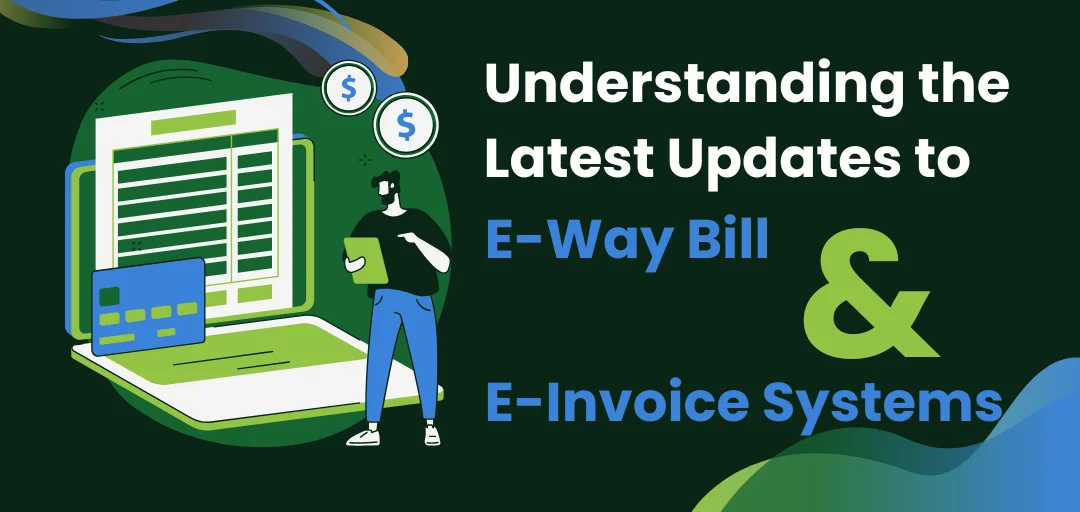Understanding the Latest Essential E-Invoice Systems and E-Way Bill Updates
The GST Network (GSTN) has announced significant updates to the E-Way Bill and E-Invoice systems, effective 1st January 2025. These updates, developed by the National Informatics Centre (NIC), aim to enhance the security and efficiency of these systems while aligning with best practices and government guidelines. Taxpayers must familiarize themselves with these changes to ensure seamless compliance.
Key Updates to E-Way Bill and E-Invoice Systems
1. Multi-Factor Authentication (MFA)
A major update involves the mandatory implementation of Multi-Factor Authentication (MFA). Currently, MFA is:
- Mandatory for taxpayers with an Annual Aggregate Turnover (AATO) exceeding ₹100 crores since 20th August 2023.
- Optional for taxpayers with AATO exceeding ₹20 crores since 11th September 2023.
Starting 2025, MFA will be rolled out as follows:
- From 1st January 2025: Mandatory for taxpayers with AATO exceeding ₹20 crores.
- From 1st February 2025: Mandatory for taxpayers with AATO exceeding ₹5 crores.
- From 1st April 2025: Mandatory for all taxpayers and users.
MFA requires login using a username, password, and OTP sent to a registered mobile number or platforms like the Sandes app. Taxpayers are advised to activate MFA immediately and ensure their GSTIN-linked mobile numbers are updated.
2. Restriction on E-Way Bill Generation Based on Document Date
From 1st January 2025, E-Way Bills can only be generated for base documents dated within 180 days of the generation date. For example, documents dated earlier than 5th July 2024 will not be eligible for E-Way Bill generation starting 1st January 2025.
This change ensures that outdated documents are not used for E-Way Bill generation, promoting better tracking and accountability in goods movement.
3. Restriction on E-Way Bill Extension Period
Another critical update is the limitation on the extension of E-Way Bills. Starting 1st January 2025:
- E-Way Bills can only be extended up to 360 days from their original generation date.
- For instance, an E-Way Bill generated on 1st January 2025 can be extended only until 25th December 2025.
This restriction prevents misuse of extended timelines and ensures timely compliance in goods transportation.
Implications of These Updates
These updates to the E-Way Bill and E-Invoice systems will:
- Enhance the security of taxpayer data through mandatory MFA.
- Ensure better compliance with GST rules by restricting outdated document usage.
- Promote transparency and accountability in goods movement.
Taxpayers, especially those in higher turnover brackets, must immediately adapt to these changes to avoid disruptions in their operations.
What Taxpayers Should Do
To stay compliant with the updated systems, taxpayers are advised to:
- Activate MFA if not already done, ensuring registered mobile numbers are updated on the GST portal.
- Review and amend internal compliance processes to align with new E-Way Bill generation and extension rules.
- Regularly monitor the E-Invoice and E-Way Bill portals for further updates.
Previous Changes in Aadhaar Authentication for GST
It’s worth noting that the GSTN has been steadily implementing measures to enhance system security and compliance. Similar changes, such as biometric Aadhaar authentication, were earlier rolled out for states like Haryana, Manipur, Meghalaya, and Tripura in December 2024.
Conclusion
The latest updates to the E-Way Bill and E-Invoice systems reflect the GSTN’s commitment to improving security, efficiency, and compliance. Taxpayers should prioritize understanding and implementing these changes to ensure uninterrupted operations.
For further details, visit the official E-Way Bill and E-Invoice portals. Stay informed and compliant to avoid penalties and ensure smooth business transactions under the updated GST framework.
Our GST Services

All E-commerce Tax services
E-commerce tax services help online sellers navigate GST registration, compliance, return filing, TCS management, tax planning, and audits, ensuring efficient tax management and legal compliance.

GST Filing
GST filing is the process of submitting tax returns to the government, detailing sales, purchases, and taxes paid or collected, ensuring compliance with GST laws.

GST Registration
GST registration is the process where businesses obtain a GSTIN from the government, allowing them to collect taxes, claim input tax credits, and comply with GST laws.






It’s truly very difficult in this busy life to listen news on TV,
therefore I only use web for that purpose, and obtain the latest information.